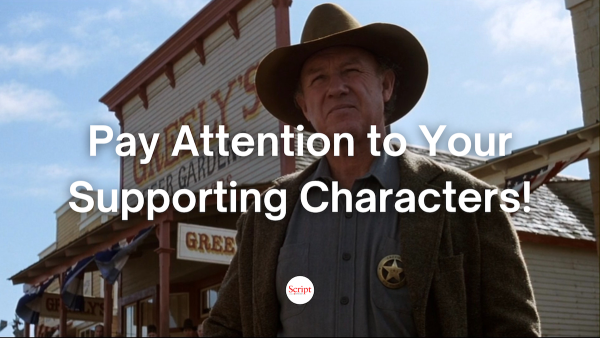BALLS OF STEEL™: Finding Character Motivation, Conflict and Compassion
What makes us root for a character? Jeanne Veillette Bowerman explores character motivation, their conflicts, and finding compassion as a writer and human.
Jeanne Veillette Bowerman is the Editor of Script magazine and a screenwriter, having written the narrative feature adaptation as well as the 10-hr limited series of the Pulitzer Prize-winning book, Slavery by Another Name, which was honored in the Top 25 Tracking Board Launch Pad Features Competition, the Second Round of Sundance Episodic Lab, and a PAGE Awards semi-finalist. Follow Jeanne on Twitter @jeannevb.
I think a lot about my characters. They come with me everywhere I go. When I sat in on Welcome Day at my daughter’s college and listened to a professor of psychology talk about fear, comfort and commonality (how fitting is it that my girl is studying psychology?). I was jotting notes… yes, mortifying my girl as other parents looked at me, totally perplexed.
As I listened to this professor’s description of his lab, which studies human behavior, trying to isolate the power of compassion and why some people have it and some don’t, I couldn’t help but think about my characters.
If a reader doesn’t have compassion for our characters, why would they want to follow them for two hours?
Two must-haves for characters is they need to be complex, giving us ways to push them past their comfort zones and make them interesting for actors to play. Plus they also need to be likeable – to have some quality the viewer can relate to – in order for us to root for them to accomplish their goals and to feel a sense of compassion for them.
I reread Danny Manus’ post, What’s Your Character’s Deal Breaker?, and started exploring the characters in my current rewrite in a new light. But me being me, I lingered a little longer in their heads and asked, “What is at the root of their deal breaker?”
Fear and comfort.
The reason people have deal breakers in the first place is to draw boundaries to keep them locked in their comfort zones.
Let's create our own psych lab: Stick your characters on the therapy couch and start prying them open. Ask, “What can I do to push this person out of their comfort zone?”
First ask your character what their goal is for their story. Then, take a timer, set it for 15 minutes and just brainstorm all the options of how you could really challenge your character to feel as uncomfortable as possible as they try to achieve their goal. There’s no doubt, 98% of what you jot down won’t be useful to the story, but if you get one or two nuggets of additional conflict, both your story and characters will be elevated.
Once you have an idea or two, set the timer again and ask, “What would this character do if placed in that uncomfortable position… how would they handle the challenge?” Observe them like a scientist. Come up with as many options as possible for their actions.
When I took Robert McKee’s three-day Story workshop years ago, one of the biggest takeaways I got was the notion that a character is defined by his actions under pressure. Turn up the pressure cooker and see what your characters do. Seeing how your character reacts to conflict makes a compelling and interesting story.
Comfort and fear go hand in hand. Some reasons people stay stuck and create deal breakers is because they’re either afraid of losing control, they don’t want to take responsibility for a decision, or perhaps they are afraid of the unknown.
If you explore your characters fear and need for comfort, you’ll learn so much about them you can use to enhance your story and create more interesting characters to attract A-list actors.
After you’ve ramped up your characters to be more multi-layered, now consider if the audience can relate to them. It’s okay if they’re totally dysfunctional. That won’t necessarily isolate them from your reader. Hell, who isn’t dysfunctional? But make sure there’s something about them the audience can relate to. If you do that, the audience will have compassion and root for them to succeed… because they themselves want to succeed.
If they can see a little bit of themselves in your characters, they’ll feel “if she can do it, so can I.” Psych 101.
Now I’m going to challenge you to do the same exercise again… on yourself.
First, write down your own goal. It can be a writing goal or a personal goal.
In 15 minutes, write down all the steps you need to take to achieve that goal and which of those steps make you highly uncomfortable. Oh yeah, I’m going there. Unless you know what it feels like to push past that unsettling feeling, you will never be able to help your characters do it.
Back to you… now only look at the list of the things that make you uncomfortable and see if there’s any pattern to it. You might be surprised what you learn about yourself. Are you afraid of losing control? Are you afraid of having to own your decision? Are you afraid of hurting people? Are you afraid of the unknown?
Remember, a character is defined by his actions under pressure.
What will you do? Will you push through your fears so you can achieve your goal, or will you stay stuck?
Breathe. Therapy is almost over.
Imagine that personal goal of yours is a goal of one of your characters. Remember, you want/need your audience to be rooting for them to succeed. What would you make that character do to push past their fears and evolve to a higher level in order to stop paying lip service to their goals and actually achieve them?
Uncomfortable yet? Good.
Now you know how your character feels.
There is much about life I have learned from my writing. Facing fears and stepping outside of my comfort zone is only a fraction of the gifts we gain as writers if we choose to accept them. Use those life lessons and inner exploration in your stories.
Once you can relate to your characters’ fears and comfort levels, dive back into the story and shake things up with more confidence.
Shake up your writing life too. Step outside of your comfort zone. Maybe even switch up your scenery and go on a writing retreat. You'll meet new writers, new worlds, and be inspired. I plan on doing some myself in the near future. One thing I love more than anything is meeting other writers and learning from them.
On a side note, one of the lessons I got from this psych professor’s lab is the learning that people who practice meditation are more likely to show compassion in life. That practice of meditation enhances creativity as well. Perhaps we’d be better writers and humans if we spent 15 minutes breathing and meditating before we sit down to write every day.
After the tragic events happening all over the world, I think a lot about that psych professor’s advice, not just because my daughter’s college is in Boston and we were walking those very streets just two days prior to the Boston Marathon bombings, but also because this crazy, scary world we live in is stranger than fiction.
Let’s try setting a timer and meditating first before we do the brainstorming exercises. For we need to be compassionate ourselves before we can create compassionate characters. Imagine how much better our world and our stories will be for it.
Get a roadmap to your story's structure and character development with our FREE Download Structure Grid of Character Development and Plot
- More articles by Jeanne Veillette Bowerman
- Balls of Steel: Change Will Do You Good
- Balls of Steel: Therapy for Your Character
How to Create Conflict to Drive an Original Story Webinar
Jeanne Veillette Bowerman is a Senior Executive at Pipeline Media Group and Book Pipeline, Editor-in-Chief of Pipeline Artists, Director of Symposium—a year-round conference in the arts, co-host "Reckless Creatives" podcast, partner at Fringe Press, former Editor-in-Chief of Script magazine and a former Senior Editor at Writer's Digest. Recognized as one of the "Top 10 Most Influential Screenwriting Bloggers," her "Balls of Steel" column was selected as recommended reading by Universal Writers Program. A compilation of her articles is now available at The Writers Store—Balls of Steel: The Screenwriter's Mindset. She is also Co-Founder and moderator of X's weekly screenwriters’ chat, #Scriptchat, and wrote the narrative adaptation of the Pulitzer Prize-winning book, Slavery by Another Name, with its author, Douglas A. Blackmon, former senior national correspondent of The Wall Street Journal. More information can be found on her website. X: @jeannevb | IG/Threads: @jeannevb_ | BlueSky: @jeannevb.bsky.social







